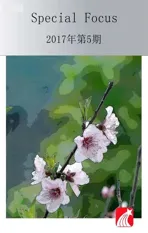An American’sSimple Life in China
2017-09-03StorybyDougLarsen
Story by Doug Larsen
Text by Liu Dongli, Julian Han
An American’sSimple Life in China
Story by Doug Larsen
Text by Liu Dongli, Julian Han
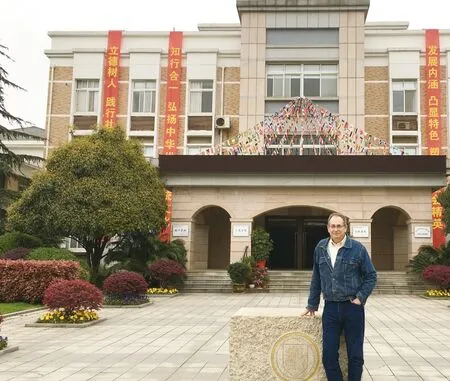
Doug Larsen was born and raised in America. Before coming to China, he was relatively well off in America, with a big house and three cars (including an RV). But now, after coming to Wuhan, China, he lives in the outskirts of the city, ten miles away from downtown, working as a teacher.
Why did he give up everything in America and choose to live in Wuhan, half a globe away from his family and old friends? Recently, Special Focus went to WFLS Meiga Academy in the Jiangxia District of Wuhan, and spoke with Doug Larsen about his past and present life. Before coming to Wuhan,
I once visited Beijing in 1999. At that time, I was a teacher and head basketball coach in a high school in New Mexico. One summer, I coached a team for a tournament in Beijing.
During our ten days in Beijing, the team visited a local private school and I was deeply touched by the students there—it was definitely the highlight of my trip. They welcomed us with such enthusiasm that I didn’t want to leave. Those students will always hold a special place in my heart.
Most of my life growing up was spent on a ranch in America with eight siblings. Yes, eight. I was the oldest of the six boys. It was a simple life and my earliest memories are of working in the fi elds with my dad.
My parents taught me what the important things in life are: Work hard. Always do your best. Respect others. Be honest, kind, and helpful to people. And above all, love. The“simple” things. We didn’t have much money, but we had everything we needed to be happy.
After college, I got married and became a teacher and coach in New Mexico. Eleven years later, in 2003, I left my teaching career to start my own business. My life during this time was squandered away spending money to try and buy happiness.
Eventually, this extravagant lifestyle took its toll on my body and soul. I woke up one morning and found myself unable to move. It was one of the darkest times of my life. There just didn’t seem to be a reason to go on any longer.
Two weeks later, my wife left me.
In September of 2013, my wife and I fi nalized our divorce. I was desperate but determined to find something that would make me feel whole again, and my experience with those students in Beijing inspired me to have a try in China.
Among all my job applications, the one sent to the WFLS Meiga Academy progressed forward seamlessly. When they offered me a contract, I took the chance.
Before coming to Wuhan, I knew almost nothing about Chinese culture. The only Chinese language I knew was “Hello,” “You are beautiful,” and“I love you.” I didn’t even say those things with the correct tones as to be understood. However, I was excited to start this new adventure.
When I finally arrived two hours late on November 15, 2003 at 11:00 pm, I didn’t know what to expect, but there it was, a bright pink sign with my name on it. Holding it was an adorable, smiling Chinese girl, Chrystal. I was exhausted but relieved. There was something that assured me I was right where I belonged.
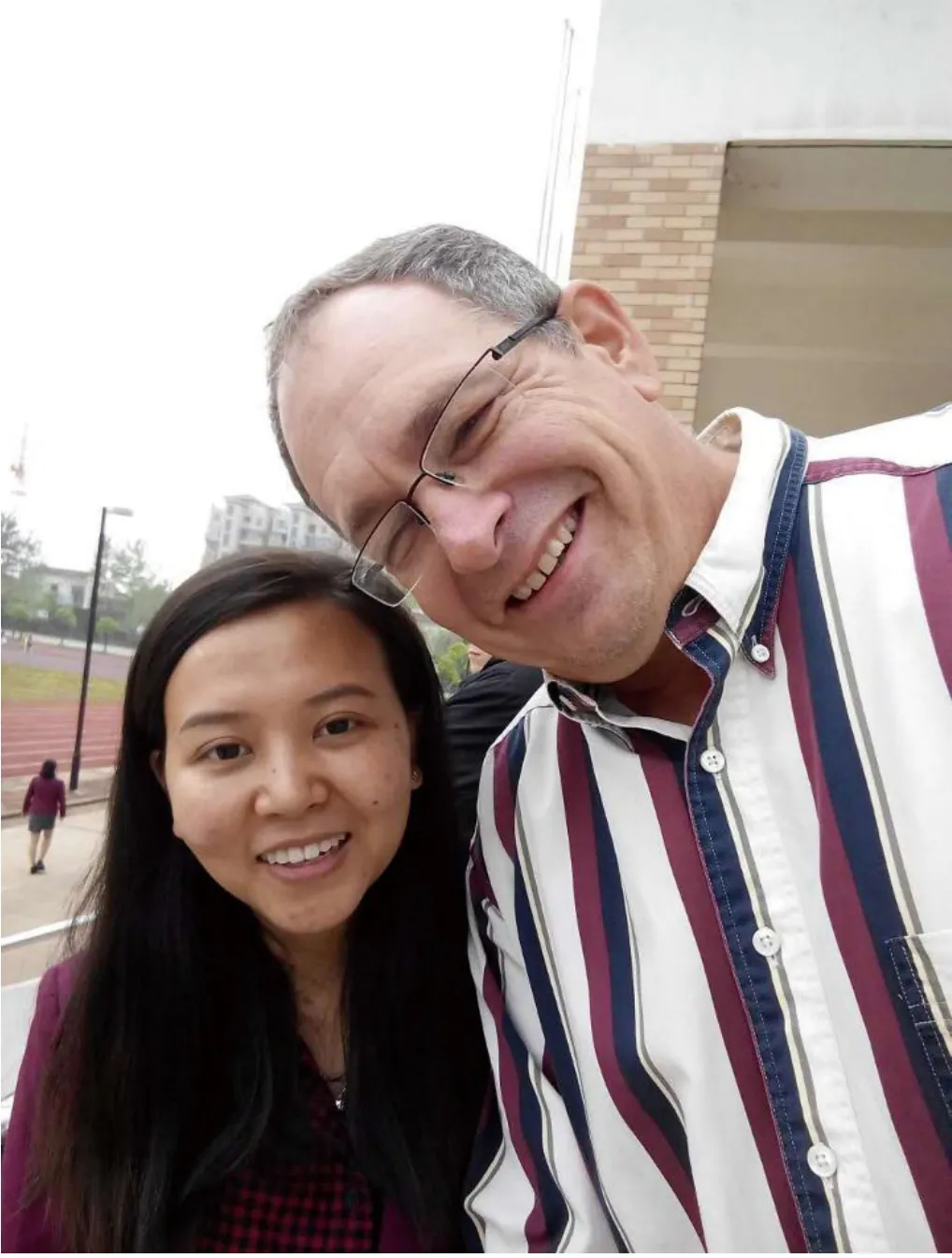
The first year in China was not easy. I still carried the weight of my life in America with me. I was still mentally and emotionally drained, and in such constant physical pain that I spent most of my time at school during the week and dreaded the weekends.
My apartment is actually smaller than my bedroom in my former house, but it has a bedroom, bathroom, and living room/kitchen. I can get almost anything I need by walking a few minutes from my apartment. It is perfect.
People here in Wuhan have a lot in common with the people I respected back in the US. They are hard-working, kind-hearted, and family-centered individuals who live“simple” lives.
I have some very special friends here in China, but at first, it seemed the only people who would talk to me were the female teachers. I couldn’t even get eye contact with most of the male teachers. It bothered me a bit and I thought maybe they just didn’t like me or that I was doing something wrong.
When I learned about the custom of giving cigarettes as a sign of friendship, I bought a pack and started handing them out. It worked.
One of the foreign teachers, John Anthony, provided me with the insight, wisdom and support I needed to deal with the cultural differences and to adjust. “No stress policy” is what he kept telling me. With his guidance, the help of the wonderful Chinese teachers, and relying heavily on my experience as a teacher in the US, I started becoming a good teacher for my students.
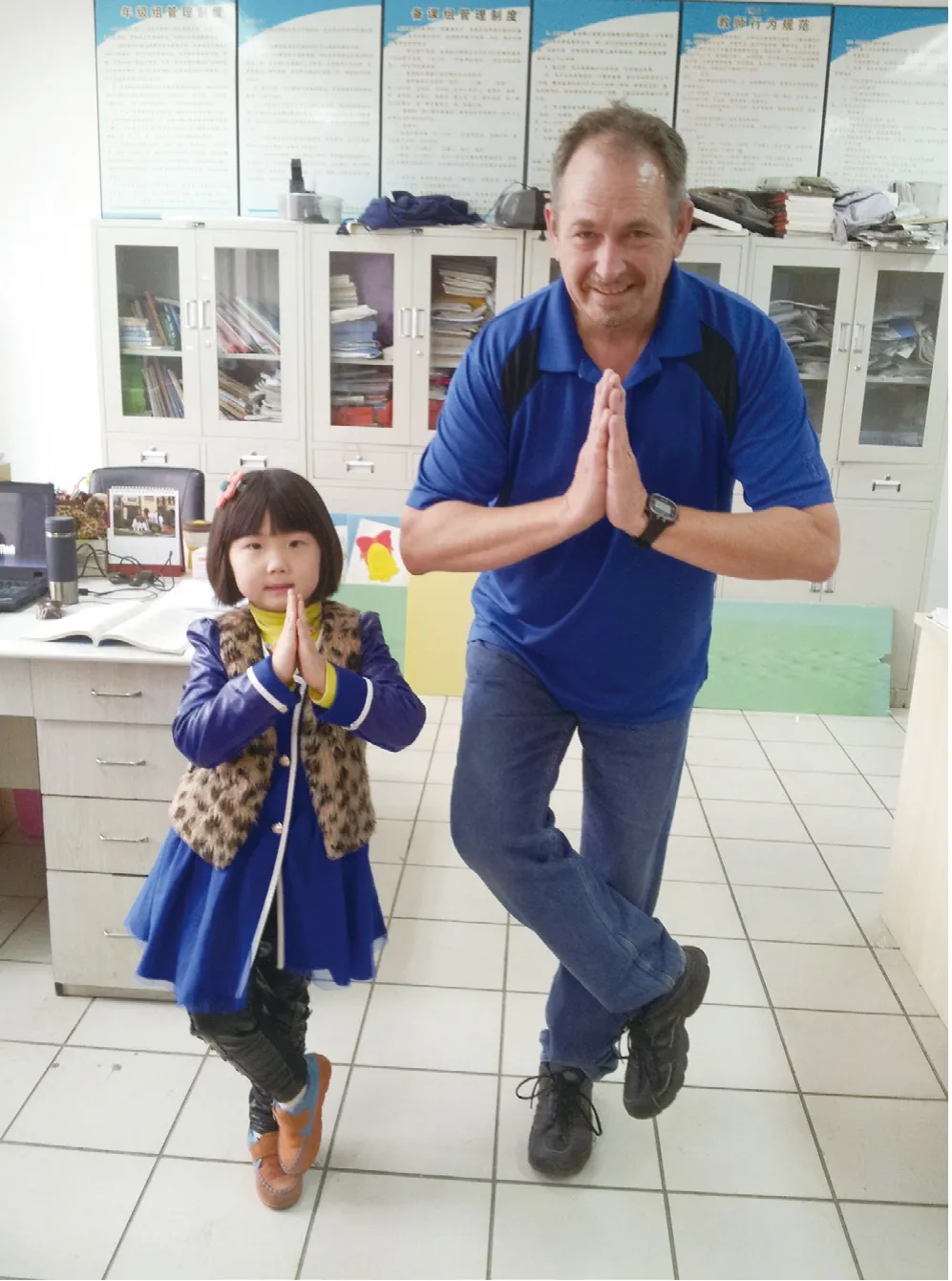
I made my fi rst close friend at a very dif fi cult moment. Just one month after arriving in China, I received news that a dear friend in the USA had taken his own life. In shock and tears, I ran out of my of fi ce and sat in the courtyard of the school. A teacher passing by, Alison, noticed I was crying and sat down, trying to comfort me without knowing what happened. We have been close friends since that day.
Another unexpected experience brought a casual acquaintance to become my dearest friend. I was walking alone in Guanggu when a spell of dizziness struck. I was desperately struggling to keep from falling to the ground before I could fi nd a place to sit.
I thought of Lizzy, a lady I had recently met. Upon receiving my call, she dropped everything and immediately came to my rescue.
Lizzy introduced me to traditional Chinese medicine and acupuncture, which was nothing like what I had experienced in the US. There were neither private rooms nor soft music with scented candles. After a period of this painful therapy and some bitter Chinese herbal medicine, I started to walk with a normal stride and could enen take stairs two at a time.
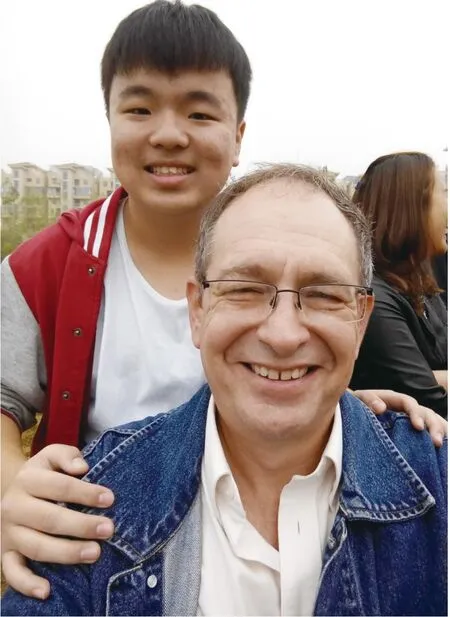
I also found a piece of the simple life in my enjoyment of Chinese food. Instead of spending hundreds of dollars on a meal at a nice restaurant, I enjoy hot dry noodles (re gan mian) for around a half of a US dollar, noodles fried with The Godmother (Laoganma chaomian) for about one US dollar, and zhu gan (pig liver) for about two US dollars, along with many other dishes that I don’t know the names of nor the ingredients. What I know is that if it has hua jiao (Chinese prickly ash) in it, I will love it.
Living in Wuhan was absolutely the cure for what was wrong in my life. After my second year in China, I was ready to let go of my business and former life in America. During my return to the USA that summer, I shut down my business and sold just about everything I owned that was left from my life there. The following year I had saved enough money to pay off almost all my debt.
It was not easy to let go of the business I had built. However, as I went through with this, the weight that had long been on my shoulders lifted off me and I felt a greater amount of freedom than I had felt in many years.
Being a teacher at Meiga Academy has rejuvenated the very fi ber of my soul. From the moment I walked through the doors, I felt a special kind of energy. When I entered the building that first day, I heard some very familiar words ringing in the halls. It didn’t strike me as real at fi rst, but as I climbed the stairs, the words began to penetrate.
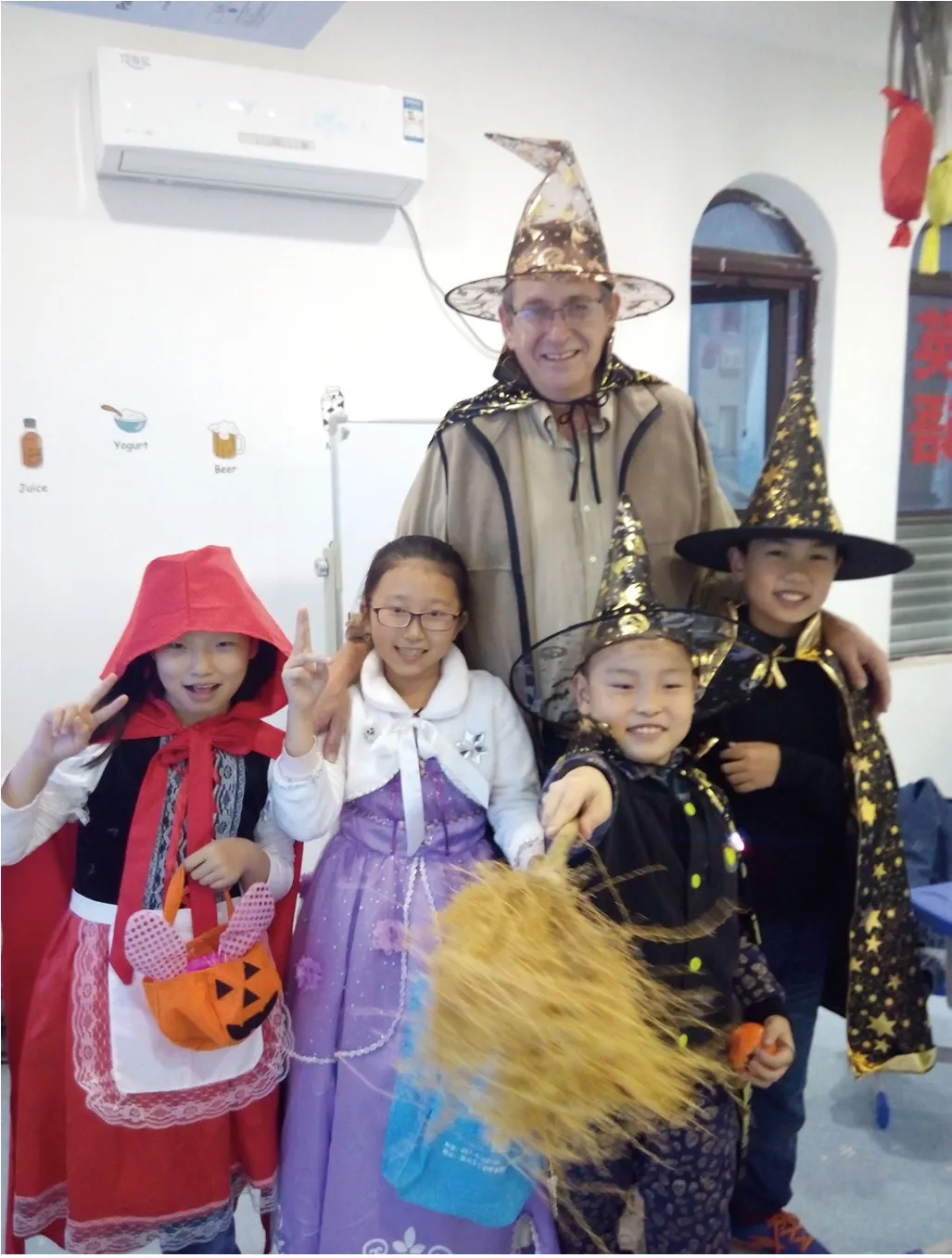
My mind did not completely grasp what I was hearing until I climbed the last few stairs and the scene came into full view. What I saw and heard took my breath away. Hundreds of Chinese students lined up in the hall reciting in unison the Declaration of Independence. They followed that with the “I Have a Dream” speech. I wasn’t dreaming. I was standing there with chills going through my body and my mind racing to comprehend.
The students I teach are all miracles. They have brought love and hope back into my heart. They are special to me and I love them dearly. I teach nineteen classes a week (Almost three-hundred students). Each class infuses me with energy, but afterwards, I am usually exhausted. When I am feeling down, or just too tired to keep going, I look into the classrooms where the students are studying. Or, during the breaks between classes, I go out in the hall and recharge my heart and mind as the students pass by, smile and say,“Hi, Mr. Dog” punctuated by a high- fi ve, fi st bump, or my personal favorite, a hug.
In these moments, it becomes as clear as anything ever has in my life that I have found the simple life again. I have found the ful fi llment and joy of those things that carry a value far greater than money and possessions. I found the things I had lost in America. I found them in a school in the outlying area of a city in China called Wuhan.
